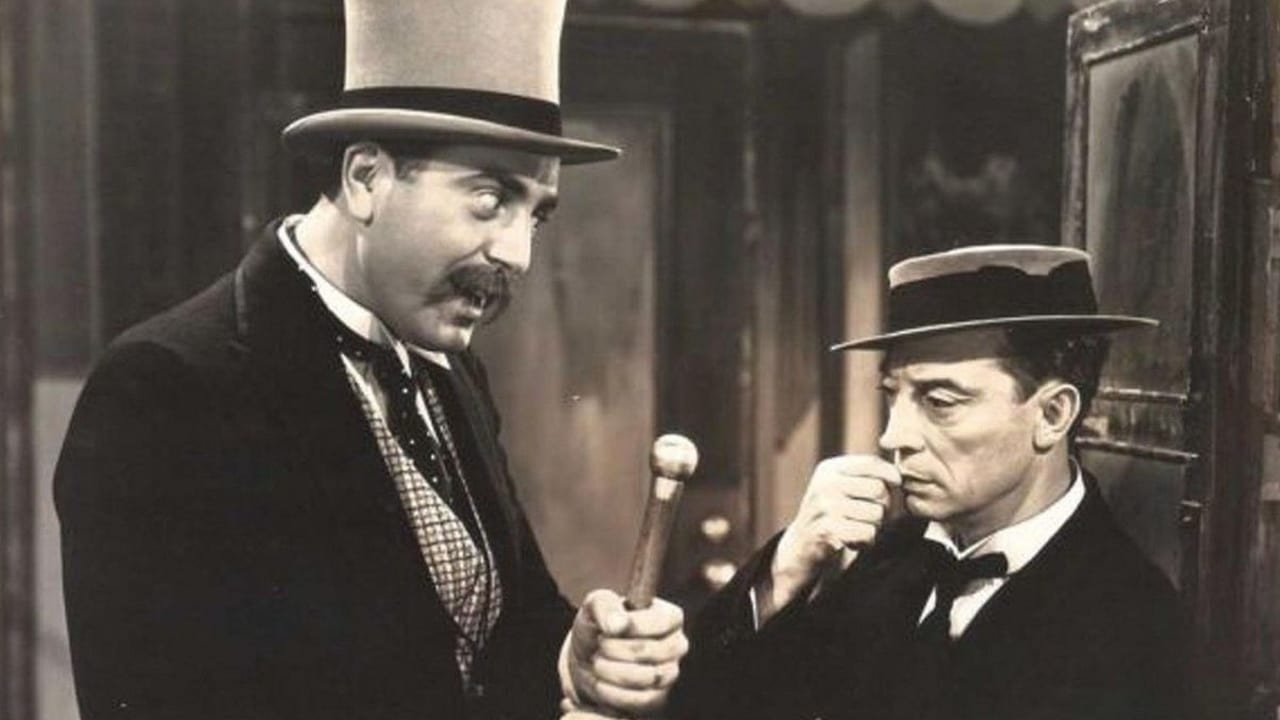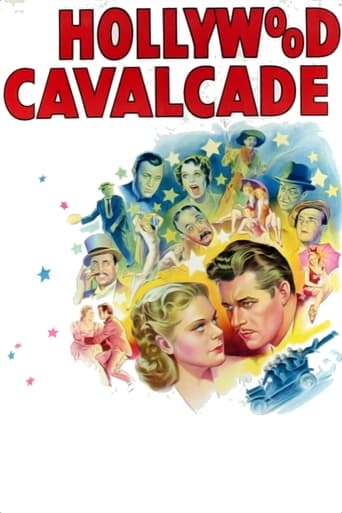Exoticalot
People are voting emotionally.
Spidersecu
Don't Believe the Hype
SpecialsTarget
Disturbing yet enthralling
Guillelmina
The film's masterful storytelling did its job. The message was clear. No need to overdo.
thefinalcredits
'The more Keystone comedies I make, the more convinced I become that comedy is an art, and a high one at that. If those who are inclined to scoff at me will try their hand at directing just one of those comedies they designate as anything but art, I am pretty certain they will concede me my point.' Mack SennettAn overlooked homage to silent cinema, this film charts the rise and fall of a self-made director whose ambition blinds him to the emotional attachment he has to the actress whose star he plots from theatrical obscurity to leading lady of the silver screen. Often regarded as a fictionalised account of the life of the 'King of Comedy', this long-term pet project of Darryl Zanuck serves as more of a composite portrait of several silent screen moguls, including the aforementioned founder of Twentieth Century Fox himself. There can be no doubt that Don Ameche's protagonist, Michael Connors, shares much of Mack Sennett's creative drive in creating his own movie company, and introducing audiences to both slapstick comedy and bathing beauties. Moreover, aside from appearing briefly on screen as himself, Sennett casts his influence over the production through connections to both cast and crew. Firstly, there are the swansong appearances by several members of his stable of silent comedy stars, such as Ben Turpin and Chester Conklin, together with the band of Keystone Cops. In addition, the director of the black and white chase sequences, Malcolm St Clair, had learned his trade under the auspices of Sennett, as had former screenwriter, Zanuck. Yet, although the screenplay is often regarded as a fictionalised account of the stormy relationship between Sennett and Mabel Normand, the reality is that Normand was already an established movie actress when they met, and her career would be mired in far greater scandal and end more tragically. The other notable influence is that of Buster Keaton, for whom this production served as a brief return to the limelight, having had his career blighted by alcoholism and having been reduced to employment as a gag writer for the Marx Brothers. Keaton's rehabilitation is at the hands of principal director, Irving Cummings, a former actor whose own big break had come in Keaton's debut feature, 'The Saphead'. In the intervening years Cummings had established himself as a director of flashy musicals starring the likes of Alice Faye, and here provided he latter, one of the ten biggest box-office draws in Hollywood at the time, with her first foray in a non-musical role. Faye not only convinces as a melodramatic actress, but also as a worthy successor to the likes of Normand in silent comedy. Despite the fact that another of his performances from that same year captured public attention, her erstwhile co-star, Don Ameche, captivates every scene in which he appears as the driven and innovative young director. Serving as Twentieth Century Fox's answer to Selznick's Oscar- garlanded 'A Star is Born' from the previous year, this production is rare in crediting another studio with its contribution to cinema. However, this apparent generosity of spirit somewhat masks the underlying self- aggrandisement of the film's producer. Firstly, as illustration of Connors' loss of instinct as to what equates box office gold, he rejects Rin Tin Tin. The rise of this canine was one of Warner Brothers' major successes, and Zanuck himself had risen to prominence as head of production within this rival studio for overseeing this four-legged star's trajectory. Moreover, in this same role Zanuck played an influential part in fashioning Warner Brothers' output including 'The Jazz Singer' which is heralded by Ameche's character as signalling the end of the silent era. One final ironic footnote revolving around this production's story-line concerns Zanuck's relationship with his movie's female lead. As Ameche noted Zanuck like many others in the studio pursued her, and Faye would ultimately turn the tables on his disloyalty like no other female star has done before or since.
mark.waltz
In the same year's "Rose of Washington Square", the two stars of this movie played fictional versions of Fanny Brice and Billy Rose, with Tyrone Power as a re-named Nicky Arnstein. In "Hollywood Cavalcade", they are playing amalgamations of a variety of early movie making legends, most obviously Mack Sennett and Mabel Normand. Like "Rose", this film later was further explored as a Broadway musical-"Rose of Washington Square" was legitimized as "Funny Girl", and part of "Hollywood Cavalcade" became "Mack and Mabel".In "Hollywood Cavalcade", Don Ameche plays a variety of Hollywood creators rolled into one; Other than Sennett, bits of Cecil B. DeMille and D.W. Griffith are thrown in as well. Alice Faye could be anybody from Pearl White (the Serial Queen), Gloria Swanson, and Mary Pickford, in addition to Normand. The first half of the film is a tribute to Sennett and Normand with the creation of the first pie fight to the bathing beauties and Keystone Cops. The second half has Ameche's character taking a more serious look at his art, making romantic thrillers much like DeMille and an "Intolerance" like epic. Normand's drug usage is never explored, although Faye's character of Molly Adair goes through many tragedies and Ameche finds himself on the outs as his temperamental ways get the better of him.What doesn't work about this film is the usage of two different moods. The first is light-hearted; the second is much darker. Many of the great silent era comics (including Buster Keaton playing a fictionalized version of himself) appear or are mentioned (one heavyset character, only seen from the back, is referred to as "Roscoe", the real name of disgraced comic legend Fatty Arbuckle). The romance between Faye and Ameche is never really explored, although it is obvious that they both love each other in completely different ways. They are only reunited professionally because of Molly's admiration for her Svengali. This is an enjoyable film, with Ameche and Faye both photographing beautifully, but the convoluted screenplay is against them.
bkoganbing
After doing a character based on Fanny Brice in Rose Of Washington Square, Alice Faye in Hollywood Cavalcade decided to do an early version of the story of Mack and Mabel for Hollywood Cavalcade. Alice does not come to as tragic an end as Mabel Normand and Don Ameche as the Mack Sennett character had far more grandiose ambitions than Sennett ever had.Budding young director Don Ameche sent to sign stage actress Alice Faye for a studio instead signs her to a personal contract and then uses that to blackjack studio boss Donald Meek into a chance for him to direct the film. Meek reluctantly caves in, but the film is a hit, a star is born and nothing succeeds like success and careers for Ameche and Faye are born.Ameche loves Faye enough, but never shows a tender side always thinking of business. She marries co-star Alan Curtis and they become instead of Mack and Mabel more like Douglas Fairbanks and Mary Pickford. Ameche in a fit of pique tears up their contract and then makes a series of bonehead decisions that tears up his career.For reasons that remain inexplicable Darryl Zanuck decided to cut a version of Alice Faye singing Whispering and the song is only heard in the background. As the song perfectly suits Faye's warm contralto, film fans are left with a loss. Maybe it will be restored one day to Hollywood Cavalcade.The main weakness of Hollywood Cavalcade comes from Ameche who is too much the nice guy to play the part he does. This role far more suited Tyrone Power who had the hero/heel down to perfection.On the plus side we get to see Buster Keaton playing himself and many of the original Keystone Kops in a film showing the development of slapstick comedy. Alice takes a good pie in the face. And Al Jolson repeats his singing of the Kol Nidre chant from the Yom Kippur scene in The Jazz Singer. Good thing Faye was not involved in a scene with Jolson because after working with him on Rose Of Washington Square she could not stand him.Hollywood Cavalcade is not a bad film, but some mistakes made in casting and in editing left it not as good as it could have been.
blanche-2
"Hollywood Cavalcade" is a mildly entertaining 1939 film starring two staples of the 20th Century Fox roster, Don Ameche and Alice Faye, and containing a couple of in jokes.The film concerns a Max Sennett type, Michael Connors (Ameche) who brings an actress to Hollywood, Molly Adair (Faye) and makes her a big silent comedienne, eventually moving her into more dramatic roles. He becomes extremely successful with her as his star. Obsessed with his work, he's absolutely shocked when she and her leading man (Alan Curtis) run off and get married. He's so shocked, he dumps her. She and her husband go off and continue to be more and more popular while Connors' studio starts losing money at an alarming rate. Before you know it, he's through. Molly wants to help and asks that Connors direct her next film.There's lots of Keystone Kop type footage, which is quite funny, and some fantastic slapstick by Buster Keaton, who is wonderful. The film also has a scene from "The Jazz Singer" when the talkies take over. The in-joke, of course, has to do with Rin Tin-Tin, for whom Zanuck used to write. In one scene, Rinny's trainer brings him in as a potential contract player for Connors' studio. Connors throws both of them out of his office. A few scenes later, Rin-Tin-Tin is shown to be #1 box office. The role of the famous German shepherd in this film is played by Rin Tin-Tin, Jr., daddy having passed away in Jean Harlow's arms in 1932, one month shy of his 14th birthday. Fortune smiled on him even at the end.Alice Faye is very pretty and does a fine job, as does Ameche, who turns in an energetic performance. J. Edward Bromberg and Stuart Erwin provide very good support.Unfortunately, this film isn't quite sure what it is - history, comedy, romance, or drama. However, "Hollywood Cavalcade" is still quite watchable.

